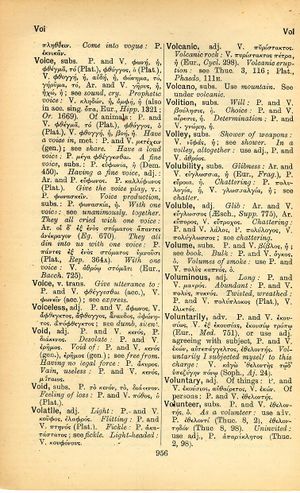void: Difference between revisions
From LSJ
ὃ γὰρ βούλεται, τοῦθ' ἕκαστος καὶ οἴεται → what he wishes to be true, each person also believes to be true | what he wishes, each person also believes
(Woodhouse 5) |
(CSV5) |
||
| Line 1: | Line 1: | ||
{{ | {{Woodhouse1 | ||
| | |Text=[[File:woodhouse_956.jpg|thumb|link={{filepath:woodhouse_956.jpg}}]]'''adj.''' | ||
P. and V. [[κενός]], P. [[διάκενος]]. | |||
<b class="b2">Desolate</b>: P. and V. [[ἐρῆμος]]. | |||
<b class="b2">Void of</b>: P. and V. [[κενός]] (gen.), [[ἐρῆμος]] (gen.); see [[free from]]. | |||
<b class="b2">Having no legal force</b>: P. [[ἄκυρος]]. | |||
<b class="b2">Vain, useless</b>: P. and V. [[κενός]], [[μάταιος]]. | |||
'''subs.''' | |||
P. τὸ κενόν, τό, διάκενον. | |||
<b class="b2">Feeling of loss</b>: P. and V. [[πόθος]], ὁ (Plat.). | |||
}} | }} | ||

